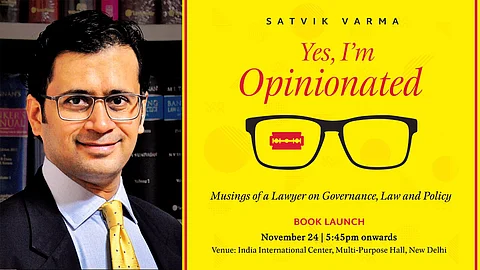
- News
- Columns
- Interviews
- Law Firms
- Apprentice Lawyer
- Legal Jobs
- हिंदी
- ಕನ್ನಡ

The launch of lawyer Satvik Varma’s much awaited book Yes I’m Opinionated – Musings of a Lawyer on Governance, Law and Policy took place on Friday at the India International Centre in New Delhi.
The book, which is an anthology of Varma’s writings on various topics ranging from Gay Rights to Insider Trading, Legitimizing Lobbying to Regulating Gaming, Insider Trading to Holidays in the Judiciary, Juvenile Justice to Competition Regulations has received advance praise and positive reviews from legal luminaries like Justice Rohinton Nariman, Justice Gita Mittal and Senior Advocates Abhishek Manu Singhvi and KV Viswanathan.
The event was attended by the who’s who of the legal fraternity, including Justice Madan Lokur, Justice G.S. Sistani, Justice Hima Kohli and many others.
One also saw the presence of Senior Advocates Soli Sorabjee, Ashok Desai, ASG Maninder Singh, SCBA President RS Suri and the Managing Partners of some of India’s top law firms including Pallavi Shroff and Diljit Titus.
Managing Partner of Karanjawala & Co Raian Karanjawala gave the opening speech, wherein he introduced the author and his book, which attempts to answer tough questions with regard to the rule of law in India. He shared that Satvik Varma is a fourth generation lawyer who understands, that law and lawyering has changed in India over the years.

Following the introduction, the author addressed the audience and spoke about his journey that led to this book. He stated that he joined law school in the year 1995 when there used to be one computer for several students and there was no concept of writing research papers or theses. Dedicating the book to his father, the author then elaborated the importance of writing for lawyers and quoted British Judge Henry McCardie,

“The profession of law has two aspects. It may be regarded as a pursuit which yields success. But it should also be regarded as a vocation which offers the joy of intellectual achievement, which claims the allegiance of unanswering honour, which asks for the guardianship of high traditions, and which affords a wide field for lawyers in generous service of the community. Lawyers perform that service by initiating the steps towards societal reforms.”
Varma’s speech was followed by a panel discussion on the “Current State of Rule of Law in India” which was moderated by CNN TV18 and had Salman Khurshid, Ranjit Kumar, Madhavi Divan and Shardul S. Shroff as the discussants. The participants discussed various topics including judicial overreach, economic rationale behind various court decisions, insolvency with special focus on real estate and judicial corruption.

On the issue of judicial overreach, Salman Khurshid stated that Article 142 is a catch-all provision and must be used as residuary power. He further said that the issue is two dimensional.
“There are matters where people feel that the judiciary is overstepping. However, in some cases, the judiciary legitimately says that since other institutions are not working, we must intervene.”
Former Solicitor General Ranjit Kumar weighed in by saying that the river Ganga is the source of life for many. To that extent, it can be called a living entity. But to say that it must be revered and treated as a person is definitely judicial overreach. He further said that even when so many cases are pending, should the courts still be interfere in everything that comes its way.
Executive Chairman of Shardul Amarchand Mangaldas Shardul Shroff stated that one has to segregate between human rights and economic rights. The exercise of power (under Article 142) must be done at the final stage and not at the interim stage.
Advocate Madhavi Divan argued that the courts have belled the cat many a time, whether it was the case of air pollution, human rights or black money. She stated that there have been aberrations but the courts do correct themselves,
“Even in the case of National Anthem being played inside cinema theaters, there has been some retreat. So the overall system is robust.”
Talking about the Right to Privacy judgment, which was recently pronounced by the Supreme Court, Ranjit Kumar stated that it was more like an academic discussion.
“I agree that the Right to Privacy is sacrosanct but I do not agree with the way it was delivered.”
On the issue of inconsistency of orders, Salman Khurshid said that every lawyer knows that the decision could change once the case goes from one bench to another,
“It is like a Russian Roulette game. Just that instead of getting shot, your case might get dismissed.”
Speaking about the Insolvency Code, Shardul Shroff, who has recently been appointed to the committee to re-examine the Code, asked what was so special about home buyers that they are being treated differently from small traders who are owed money by someone.
“Courts are acting merely on sympathy. Home buyers are unsecured creditors…Are we going to ignore the fundamental principle of insolvency?”
Satvik Varma’s book launch witnessed a bold and candid discussion which ended after covering a host of issues which affect the current state of rule of law in India with the panelists giving their opinions as to how the system presently functions and how it could be made better.